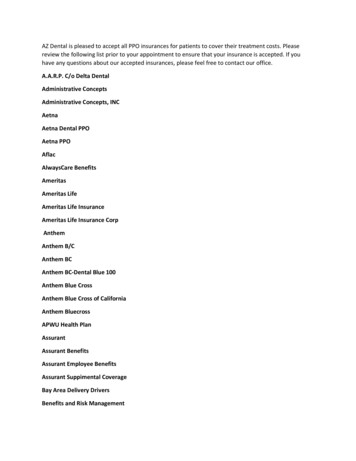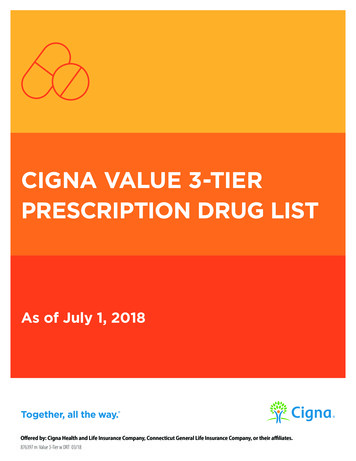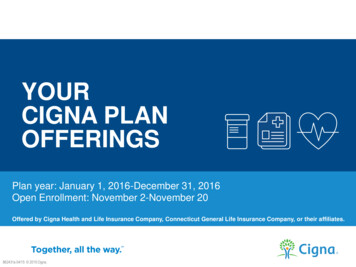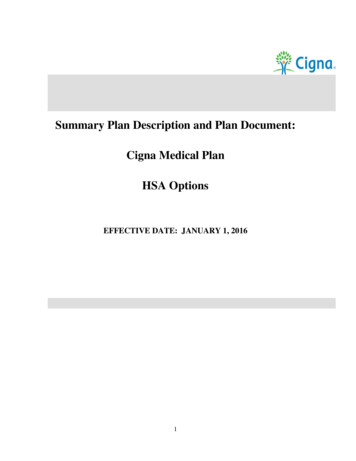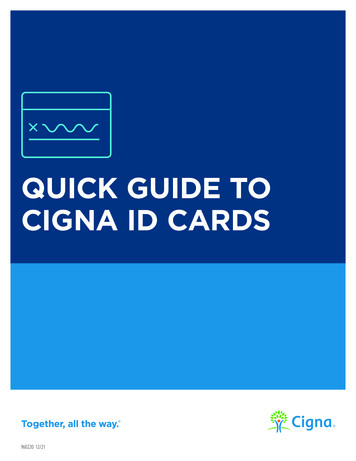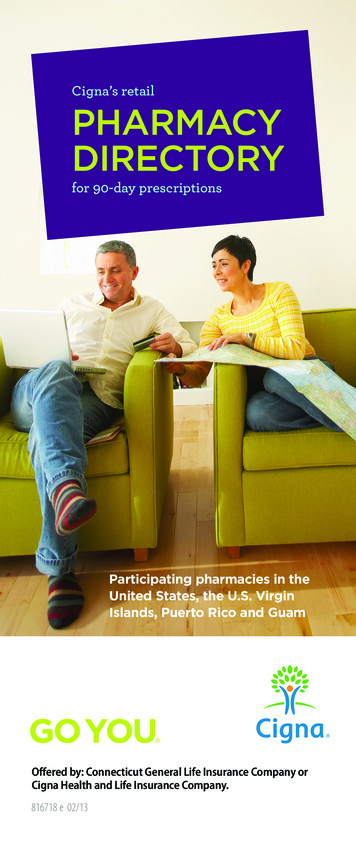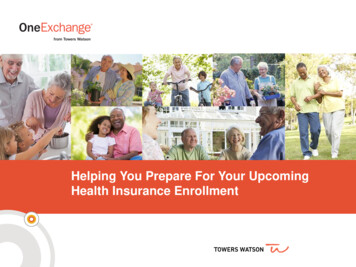
Transcription
Cigna Dental ReportBEHIND THE SMILEOral Health Impacts Self-Esteem,Confidence and EmployabilityOffered by: Cigna Health and Life Insurance Company and its affiliates.930138 11/19
Study Confirms Oral Health and Confidence are Connected1Understanding the connection between oral andoverall health is just one component of Cigna’scommitment to whole-person health, and it’s thedriving force behind some of our clinical programsdesigned to identify and help patients diagnosed withmedical conditions that may be impacted by gumdisease.But we also know that whole-person health is morethan just physical well-being. Whole-person health iswell-being for the body and the mind, because thereis an inextricable connection between the two.2When one is out of balance, it can impact wholeperson health. This “body and mind” connection isthe reason Cigna commissioned a study on theimpact oral health has on self-esteem and confidence.health can have on other aspects of their life. In fact,smile satisfaction is one of the top three driversof self‑confidence across U.S. adults from variousattitudinal, demographic and behavioral backgrounds.The other two drivers of self confidence were being inthe silent generation and having high income. Whenviewed as a complete picture, the data from thisstudy illustrates a tremendous opportunity to help ourcustomers achieve higher levels of self-confidenceand satisfaction through better oral health andimprovements to the appearance of their smile.Our research into the impact of oral health onconfidence among Americans resulted in somecompelling findings. Although one can anecdotallyassume that self-confidence is lower in people whohave oral health conditions that may impact theirappearance when they smile, the data shows justhow impactful one’s feeling about their own oralSmile Satisfaction and the Impact of Oral Health on Confidence1Most of the people surveyed indicated they were“very or completely satisfied” with their smile.However, 15% of them reported being “not at allor not very satisfied.” A similar percentage – 16%– said their smile impairs their self-confidence.Smile satisfaction ratingsAnd when asked about smile satisfaction ratings,a pattern begins to emerge that illustrates theconnection between smile satisfaction encecompletelysatisfied withtheir smileOf those who are completely satisfied withtheir smile, 93% rate their self‑confidenceas excellent or very good.Among those who are not at all satisfiedwith their smile, only 30% call theirself‑confidence excellent or very good.›excellentself-confidence30%Oral health impact on confidence levelThe driving factors of self-confidence aremore than just “liking” your smile, though,and this becomes evident when respondentswere asked about their oral health.›not at allsatisfied withtheir smile91%excellentself-confidencewhen oralhealth isexcellentAmong those who say their oral healthis excellent, 91% say their self‑confidenceis excellent or very good.Among those who say their oral healthis fair or poor, only 37% rate theirself‑confidence as excellent or very good.2when oral healthis fair or poorexcellentself-confidence37%
Self-Confidence and Routine Dental Care are Connected1The study showed that people who report having“excellent” oral health have higher self-confidencethan those who report “fair to poor oral health.”Adults who have routine dental care two or moretimes per year report significantly higher ratesof self-confidence than people who go less thanonce a year or not at all. This is because routinepreventive care can address problems beforethey become serious, and before those problemsbegin to affect the condition of their gums, teethand their smile.Benefit Coverage Confidence Level1The absence or presence of benefits that help provide dental care services also has an impact onself‑confidence. When surveyed, the percentage of respondents who said they have “excellent or very good”levels of self‑confidence are markedly different, with those who have coverage reporting higher rates ofconfidence than those who don’t.Frequency of routine preventive visitsto the dentist each yearPercent reportingexcellent/very good self-confidenceTWO or more75%Less than ONE54%NEVER49%Percentage of people reporting “excellent or very good” self-confidence,based on dental coverage status.People with at leastten years of continuousdental coverage:74%Peoplewithoutdental coverage:66%3Of those who reported havingpoor, fair or good self-confidence,7%made a reference to oralhealth improvement being one wayto boost their self-confidence.
Beyond Self-Confidence – The Impact of Poor Oral Healthon Employability1The impact that oral health and one’s feelingsabout their smile has on self-confidence is alarming.But the cause and effect of oral health and smilesatisfaction doesn’t stop at self-confidence. Theinsecurities about smiles and oral health have hada direct impact on employment opportunities formany of the people included in this study.››21%More than 21% of people surveyed reportedfeeling less confident about job interviewsbecause of their smile or the state of theiroral health.of those surveyed reported feelingLESS CONFIDENT ABOUT JOB INTERVIEWSBECAUSE OF POOR ORAL HEALTH12% believe their smile or oral healthAnd 12% believe their smile or oral healthcondition held them back from getting a jobor getting a promotion.CONDITION HELD THEM BACK FROMGETTING A JOB OR GETTING A PROMOTIONAddressing the Opportunity for Oral Health Improvement1It’s clear there is a connection between oral healthand smile satisfaction, and how confident peoplefeel. And this connection can have a direct impacton a person’s life, including lower employability,lower levels of satisfaction with their appearance,and an increased sense of stress or discomfort in avariety of settings because of how they feel abouttheir smile or oral health. The statistics captured inthis study also show that most U.S. adults alreadyWhen viewed as a complete picture, the data fromthis study illustrates a tremendous opportunityto help our customers achieve higher levels ofself-confidence and satisfaction through betteroral health and improvements to the appearanceof their smile. In recognizing the connectionbetween physical concerns and stress, and lowself‑confidence, we can begin to examine ways wecan help people have better whole‑person health,body and mind.think their oral health and smile could be improved.› 63% say they could benefit fromoral health improvements› 58% say their smile could be improvedORAL HEALTH IMPROVEMENT OPORTUNITIES:63%58%say they could benefit fromoral health improvementssay their smile couldbe improved4
Solutions Designed to Help Improve Whole-person Health1Cigna Dental plans include important preventive care› Tooth discoloration is the most commonlyreported oral health condition across all agesservices designed to help customers achieve goodoral health. But many of the things that people sayimpact their self-confidence go beyond just cleaningsand exams. Missing teeth, crooked teeth, discoloredteeth – these are all aspects of oral health thatpeople who report lower levels of self‑confidencemay be living with. They are also often the result ofnot having access to dental benefits, or not gettingrecommended preventive care, and require moreinvolved procedures to rectify.›–19% of Gen Z mention teeth whitening› 48% of Gen Z and 40% of Millennialsmention brushing and flossingOf the 58% of respondents who say their smile couldbe improved, many mentioned teeth whitening andteeth straightening as ways they could achieve smileimprovement. Cigna recognizes that having accessto these services can help improve customers’ selfconfidence, which leads to better health through thebody and mind connection. That’s why our CignaDental Care (DHMO)3 plans include teeth whiteningand orthodontia for adults, including the popularInvisalign option that allows patients to undergoorthodontic treatment with their orthodontist/dentistwithout having to wear metal brackets and wires.4We also have the option to add dental implantcoverage to our plans, which means customers havea choice when it comes to replacing lost teeth.4Younger generations tend to focus onappearance rather than oral health.– Vanity concerns (discoloration, straightening)are more frequently brought up by youngergenerations in terms of improving oral health,but they are also the most optimistic that theiroral health and their smiles can be improved.Clinical Expertise Leads to Innovation – Going Beyond theStatus Quo1Cigna Dental is a whole-person health company,focused on the impact dental care has on ourcustomers’ well-being.Today’s workforce is evolving, with the majorityof workers falling into the Millennial age bracket.7This means employers need to be aware of (andresponsive to) how this group views their ownoral health and the ways in which they wouldlike to access care. “Care that comes to them” isincreasingly appealing to employed adults, and theidea of virtual visits is especially of interest to theGen Z age range.Why? Because we know if our customers overlooktheir dental health and well-being, their physicaland emotional wellbeing is at stake. As we continueto identify connections between oral health andwhole-person health, we look for opportunities tobridge gaps and solve health challenges throughthe development of innovative new dental programsand products. This “identify engage treat prevent” philosophy has coalesced in the creationof the Cigna Dental Health Connect program.Cigna Dental Health Connect serves as a guidingprinciple for the development of programs like theCigna Dental Oral Health Integration Program 5,Onsite Dental Care6, The Dental Outreach Program,Safe Prescribing Measures for Opioids and otherservices designed to help identify ways to improveoverall health through dental initiatives, and toensure those who need dental care or services haveaccess to them, regardless of barriers that may haveprevented them from receiving care in the past.Of those who say going to the dentist isinconvenient 29% point towards work schedules ordifficulty getting to the dentist.›Among employed adults, 22% indicate thatdental appointments at their workplace wouldbe appealing.› 3 in 10 Gen Z and Millennials like idea ofappointments at workplace› 28% of Gen Z like the idea of virtual visits.5
A UNIQUE CARE MODEL – SO EVERYONE THRIVESCigna Dental Health Connect Our guiding principle that drives the delivery ofinnovative solutions through clinical insights and expertise.Using insights tofind opportunitiesHEALTH CONDITIONSIMPACTED BYORAL HEALTHConnecting peopleto innovativesolutions Dental OutreachProgram Cigna Dental OralHealth IntegrationProgramACCESS TO CARE Onsite Dental Care Network GrowthSAFE PRESCRIBINGMEASURES Safe Prescribing 3-day supply8OUR APPROACH TO BETTER HEALTH AND COST SAVINGSCustomerIdentifyEngageTreatPreventClinical insightsidentify opportunitiesto deliver betteroutcomes throughspecialized solutions.Clinical insightsallow us toengage patientswho couldimprove overallhealth or chronicconditionsthroughspecialized dentalprograms orservices.Specializedprograms andservices enablecustomers toreceive caredesigned toaddress thebarriers to betterwhole‑personhealth.When treatmenthas helpedimprove wholeperson health,prevention iskey to helpingcustomer stayhealthy throughpreventive careservices. Cigna DentalOral HealthIntegrationProgram Dental Outreach Safe Prescribingfor Opioids Onsite DentalCareAt Cigna, dental health is in our DNA. And so is whole health. That enables us to offer a unique,personalized solution for our customers’ busy lives.We are a leader in clinical expertise for all aspects of our customers’ lives, and our insights on how toimprove whole-person health means our customers and our clients get access to personalized caredesigned to deliver the right solutions and improved outcomes – for body and mind.For more information, contact your Cigna representative.6
Cigna’s Study – Demographics.Vendor name: M/A/R/C ResearchFieldwork: June 5-15, 2019Study Design: Online consumer surveySample Source: DynataMarket: United StatesQualifications: 1,000 U.S. residents, aged 18 .Quotas were set up to ensure the compositionof respondents approximated the population ofU.S. adults on gender, age, and Census region.Limits were also set up to ensure percentages ofunemployed respondents completing the surveydid not exceed national percentages.Question areas l demographic informationInsurance coverage informationSelf-confidence rating and follow-upsSmile ratings (in conjunction with skin and weightratings) and follow-upsOral health ratings and follow-upsTeeth straightenersImpact of smile/oral health on employmentPerceptions of others’ smile/oral healthDental behavior (brushing, flossing, routine exams)The study was conducted in early June 2019,and included 1,000 U.S. residents age 18 andover. Quotas were established to ensure thecomposition of respondents approximatedthe population of the United States ongender, age and census region. Limits werealso established to ensure the percentagesof unemployed respondents did not exceednational percentages.Cigna commissioned this study to explore therelationship between oral health and mentalwellbeing. This research was conductedamong consumers to better understand oralhealth’s impact on self-esteem, confidence,employability, stress, and the ability to makeand maintain meaningful social connections.The goal of the research was to generateinsights around whether or not having dentalcoverage has a direct impact on mentalwellbeing. The research findings and storiesthat emerged will be used to educate new andprospective clients, producers, consumers, andinternal stakeholders – as well as strengthenCigna’s dental brand value through forwardthinking insights.Convenience/stress of going to dentistOverall health and treatment for anxiety/depressionAdditional demographics1. “Exploring the relationship between oral health and mental wellbeing.” Cigna research study, October 2019.2. “Oral health: A window to your overall health.” Mayo Clinic, June 2019. -health/in-depth/dental/art-200474753. The term DHMO (“Dental HMO”) is used to refer to product designs that may differ by state of residence of enrollee, including but not limited to, prepaid plans, managed care plans, and planswith open access features. The Cigna Dental Care plan is not available in every state. There are no out-of-network benefits, except for emergencies and where required by law.4. Not all services are covered. Limitations may apply. See your plan documents for costs and details of coverage.5. Covered employees must enroll in the Cigna Dental Oral Health Integration Program prior to receiving dental services to be eligible for reimbursement. This program provides reimbursement forcertain eligible dental procedures for customers with qualifying medical conditions. Reimbursement is applied/subject to applicable plan year maximums. Contact your Cigna representative fora list of eligible procedures.6. Dental Outreach Program only available for pre-approved clients.7. Fry, Richard. “Millennials are the largest generation in the U.S. labor force.” Pew Research, April 2018.8. Cigna-administered pharmacy plans limit coverage to a 3 day supply, subject to applicable plan terms and conditions, including medical necessity, licensed prescriber/pharmacy, network andcost-share requirements.Product availability may vary by location and plan type and is subject to change. All group dental insurance policies and dental benefit plans contain exclusions and limitations. For costs and details ofcoverage, review your plan documents or contact a Cigna representative.All Cigna products and services are provided exclusively by or through operating subsidiaries of Cigna Corporation. Cigna Dental PPO plans are insured or administered by Cigna Health and Life InsuranceCompany (CHLIC) with network management services provided by Cigna Dental Health, Inc. (CDHI) and certain of its subsidiaries. In Texas, the insured dental plan is known as Cigna Dental Choice, andthis plan uses the national Cigna DPPO network. Cigna Dental Care (DHMO) plans are insured by Cigna Dental Health Plan of Arizona, Inc., Cigna Dental Health of California, Inc., Cigna Dental Health ofColorado, Inc., Cigna Dental Health of Delaware, Inc., Cigna Dental Health of Florida, Inc., a Prepaid Limited Health Services Organization licensed under Chapter 636, Florida Statutes, Cigna DentalHealth of Kansas, Inc. (KS & NE), Cigna Dental Health of Kentucky, Inc. (KY & IL), Cigna Dental Health of Maryland, Inc., Cigna Dental Health of Missouri, Inc., Cigna Dental Health of New Jersey, Inc., CignaDental Health of North Carolina, Inc., Cigna Dental Health of Ohio, Inc., Cigna Dental Health of Pennsylvania, Inc., Cigna Dental Health of Texas, Inc., and Cigna Dental Health of Virginia, Inc. In other states,Cigna Dental Care plans are insured by CHLIC or Cigna HealthCare of Connecticut, Inc., and administered by CDHI. CHLIC policy forms: OK – DPPO: HP-POL99/HP-POL388, DHMO: POL115; OR - DPPO:HP-POL68/HP-POL352, DHMO: HP-POL121 04-10; TN – DPPO: HP-POL69/HC-CER2V1/HP-POL389 et al., DHMO: HP-POL134/HC-CER17V1 et al. The Cigna name, logo, and other Cigna marks are ownedby Cigna Intellectual Property, Inc. All pictures are for illustrative purposes only.930138 11/19 2019 Cigna. Some content provided under license.
impact oral health has on self-esteem and confidence. Our research into the impact of oral health on confidence among Americans resulted in some compelling findings. Although one can anecdotally assume that self-confidence is lower in people who have oral health conditions that may impact their appearance when they smile, the data shows just


